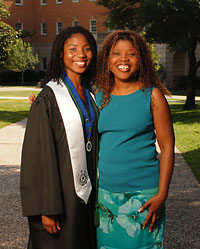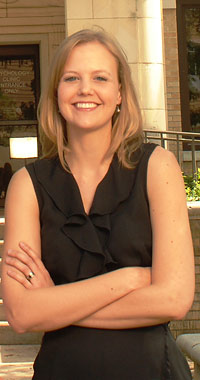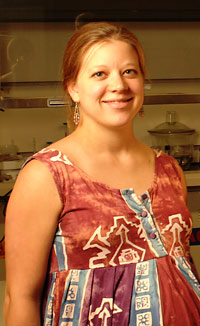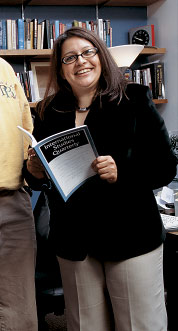 |
|||||||||||||||||

More from our scholars
UNT Office for Nationally Competitive Scholarships |
More from our scholars The North Texan caught up with five past winners of nationally competitive scholarships to find out what they’ve accomplished since winning their scholarships and how they received help from faculty mentors.
Constance Lacy Harry S. Truman Scholarship, 1998 As the center manager of the Eddie Bernice Johnson Youth & Family Center in Dallas, Constance Norris Lacy (’98) — UNT’s first Truman Scholar — supervises licensed clinicians who provide family and individual counseling to students at 15 schools in the Dallas ISD. It’s not the first time Lacy has worked in a nonprofit organization. She became a secretary at Dallas Can Academy in 1986 and gradually assumed more responsibilities, helping single parents develop good parenting skills and high school students develop time management and study skills. She was named Dallas Can Employee of the Year in 1993 after coordinating a support group for pregnant teenagers. When Lacy left her job in 1996 to re-enroll at UNT, a classmate told her about the Ronald E. McNair Postbaccalaureate Achievement Program. The program encourages low-income students, or those who are the first in their families to attend college, to pursue doctoral degrees. McNair scholars receive stipends to do research under the guidance of a UNT faculty member. After Lacy became a McNair scholar, James Duban, director of the Office for Nationally Competitive Scholarships, told her about the Harry S. Truman Scholarship program. “I was married with children, so Truman was the only national scholarship I could apply for,” Lacy says. “It took about a year to prepare for it by filling out the application and doing mock interviews.” Lacy also turned to Linda Rollins Threats, then an assistant professor of rehabilitation, social work and addictions, for advice. Lacy had conducted research on court-assigned intervention programs in divorce with Threats, her mentor in the McNair program. Lacy says Threats reminded her to consider her children’s needs as well as her own in trying to balance a career with a family. Now Lacy is proud that one of her daughters, Keilah Jacques, graduated in May with a social work degree, and has also conducted research as a McNair scholar. Lacy’s other daughter will attend the University of Houston, and her son is working for an architectural firm. “My success has encouraged my children to pursue to the fullest,” Lacy says. In addition to her work at the Eddie Bernice Johnson Youth & Family Center, Lacy has a part-time practice in family counseling and is a part-time instructor at Eastfield College in the Dallas County Community College District. She plans eventually to teach at the university level.
Laura Howe-Martin Rotary Ambassadorial Scholarship, 2001 Two weeks after the terrorist attacks on Sept. 11, 2001, Laura Howe-Martin (’01) boarded a plane for Birmingham, England, where she was to study at the University of Birmingham as a Rotary Ambassadorial Scholar. Once arriving in Birmingham, Howe-Martin realized “that one out of every five people I saw were from Muslim countries.” She says interacting with her new Muslim friends helped her move beyond stereotypes that some Americans held after 9/11. “I learned so much about their culture. It gave me a broader perspective of the world,” she says. Howe-Martin learned about Rotary Ambassadorial Scholarships when she was a student in UNT’s Honors Program. She says she decided to apply for a chance to represent and serve Texas and the United States as “an ambassador of goodwill to another country.” “The scholarship was a wonderful opportunity for me,” she says, adding that her year abroad helped prepare her to enter UNT’s doctoral program in clinical psychology, which she entered in August 2003. “The education system in England is structured so differently. You go to class only about once a week and take one exam at the end of the semester, which is comprised of two essay questions. You spend more time working on your own,” she says. While applying for the scholarship, Howe-Martin received encouragement from both Gloria Cox, director of the Honors Program, and Sharon Jenkins, associate professor of psychology. “Sharon is very student-oriented. When I met with her, she asked where I was going to graduate school. I hadn’t thought about graduate school until then,” Howe-Martin says. “I felt that I could walk in her office and say, ‘This is what I’d like to do,’ and she would support me.” After returning from England in June 2002, Howe-Martin taught at Poolville High School in Parker County while deciding where to attend graduate school. She chose UNT partly for the chance to have Jenkins as her major professor. “I had been offered a placement at Boston College in counseling, but I wanted clinical psychology, and I had a really good relationship with Sharon,” she says. Howe-Martin is currently researching male college students’ attitudes toward rape and how those attitudes develop. After receiving her doctoral degree in May 2008, she plans to work at a hospital or a university.
Haley Hagg Lobland Barry M. Goldwater Scholarship, 2001 Haley Hagg Lobland (TAMS ’01) says she didn’t know anything about materials science when she began working in the Laboratory of Advanced Polymers and Composites, directed by Witold Brostow, Regents Professor of materials science. She soon discovered, however, that her interest in chemistry fit right in with materials science, and a month before graduating from UNT’s Texas Academy of Mathematics and Science, she received a Barry M. Goldwater Scholarship. She chose to attend Texas A&M University, where she earned a bachelor’s degree in chemistry in 2003. She then went to the Mayo Graduate School at the Mayo Clinic in Rochester, Minn., to earn a master of science degree in biomedical sciences. Shortly before she graduated from the Mayo Graduate School last May, Lobland received another nationally competitive scholarship — a $92,000 National Defense Science and Engineering Fellowship from the U.S. Department of Defense. She used the award to return to UNT and become a doctoral student in materials science. She currently focuses on tribology and mechanical properties of materials used in bone replacements and dental fillings and coatings. She says she chose to return to UNT to work with Brostow again. “Materials science was not only an area that I liked, but I knew I would have a great mentor.” Lobland says she learned in Brostow’s laboratory that “there’s no immediate gratification in scientific research.” “In research, you’re not reading the textbook — you’re creating it,” she says. “Years later, you look back and realize that you did contribute something after all.” Each TAMS student in Brostow’s laboratory is assigned to a graduate student who provides guidance. Lobland works with TAMS junior Bernard Huang on testing scratch resistance of materials. “I try to encourage him to ask questions and not let computers do the complete analysis,” she says. Lobland plans an engineering and teaching career after she receives her doctoral degree in 2008. She’s grateful for all the guidance she’s received since she first stepped into Brostow’s laboratory six years ago. She also credits James Duban for helping students with interview and presentation skills, adding that she kept in touch with him as well as Brostow after graduating from TAMS. “We even bounced e-mails back and forth when I was still in Minnesota and applying for the defense fellowship. He had good advice,” Lobland says.
Tanya Vazquez Jacob K. Javits Fellowship, 1998 Tanya Vazquez (’98) — now with an Austin consulting firm providing campaign services to political candidates — has served as chief of staff to Texas State Rep. Trey Martinez Fischer of San Antonio; as a special assistant in the Washington, D.C., offices of Rep. Richard Gephardt (D-Mo.), then House minority leader; as a finance director for the Texas Democratic Party; and on former Dallas Mayor Ron Kirk’s campaign for U.S. Senate. But she didn’t expect to pursue a career in politics when she transferred to UNT in 1996 from the University of Texas at Austin. As an English major and a student in both the Honors Program and the Ronald E. McNair Postbaccalaureate Achievement Program, she researched literature with Edra Bogle, now retired from the English faculty. After Vazquez switched her major to history, she looked for a new faculty mentor for the McNair program. “Ever since I was a kid, I was interested in international relations. The political science department was in the same building as the history department, so I looked up faculty members there,” she says. Vazquez introduced herself to Steven Poe, professor of political science, after reading about his human rights research on the UNT web site. She soon found herself reading 20 years’ worth of human rights reports from the U.S. State Department and Amnesty International with Poe and graduate student Sabine Carey. “The reports focused on people being tortured or kidnapped for political reasons,” she says, adding that she, Poe and Carey found significant differences between what the State Department published during certain presidential administrations and what Amnesty International published. The research, published in Human Rights Quarterly with Vazquez, Carey and Poe as the authors, helped Vazquez win a Jacob K. Javits Fellowship shortly before she graduated with her bachelor’s degree in history in May 1998. (She was also a finalist for the British Marshall Scholarship and the Harry S. Truman Scholarship.) The Javits program was created by Congress as a counterpart to the National Science Foundation’s Graduate Fellowship Program. Vazquez used her fellowship to enter the doctoral degree program in political science at Stanford University, which gave her a full scholarship in addition to the fellowship. She left, however, to work full time for Gephardt. In 2001, Vazquez left Capitol Hill to return to UNT, where she entered the master’s program in international relations and comparative politics. She is currently writing her thesis for the degree. Jeremy Holman Morris K. Udall Undergraduate Scholarship in Environmental Public Policy, 2003 In the fall of 2000, Jeremy Holman (’04) was one of eight students in UNT’s Honors Program invited to attend a luncheon with Warren Burggren, dean of the College of Arts and Sciences. At the luncheon, Burggren asked the students about their career goals. “I told him I wanted to be a marine biologist,” says Holman, who grew up in Oklahoma but spent five years at sea on the Navy ship USS Cleveland. “When he heard that, he told me to come by his lab sometime. I showed up at his door the next morning.” Holman met several more times with Burggren, a professor of biology who researches environmental and ecological physiology of intertidal, freshwater and marine ecosystems. The meetings led to Holman, who was also a student in the Ronald E. McNair Postbaccalaureate Achievement Program, working in Burggren’s laboratory for his McNair research project. Burggren’s laboratory focuses on animal embryos and their link to human heart development. Holman studied developmental physiology in zebra fish, which have hearts similar to humans in early stages of development, and oxygen uptake in blue crabs. He says his biggest challenge in doing research was “trying to design various apparatuses for my experiments and then figuring out how to use them properly.” “I had to learn to troubleshoot on my own,” he says. “But Dean Burggren was very inspiring. You always felt like you wanted to get the work completed for him.” Holman’s research resulted in his spending the summer of 2002 at Grice Marine Laboratory in Charleston, S.C., conducting research in a program supported by a National Science Foundation Research Experience for Undergraduates grant. He was invited back to Grice for the summer of 2003. That year, he received a Morris K. Udall Undergraduate Scholarship in Environmental Public Policy. Open to college sophomores and juniors, the Udall Scholarship provides a maximum of $5,000 for one year to students who have outstanding potential to pursue careers in environmental public policy. After earning his bachelor’s degree in biological sciences in 2004, Holman enrolled in the biology master’s program at Louisiana State University, where he is researching the physiology of low-oxygen tolerance in ghost shrimp. He expects to graduate in August and is considering graduate and professional school options.
|
||||||||||||||||||||||||||||||||||||||||||||||||||||



